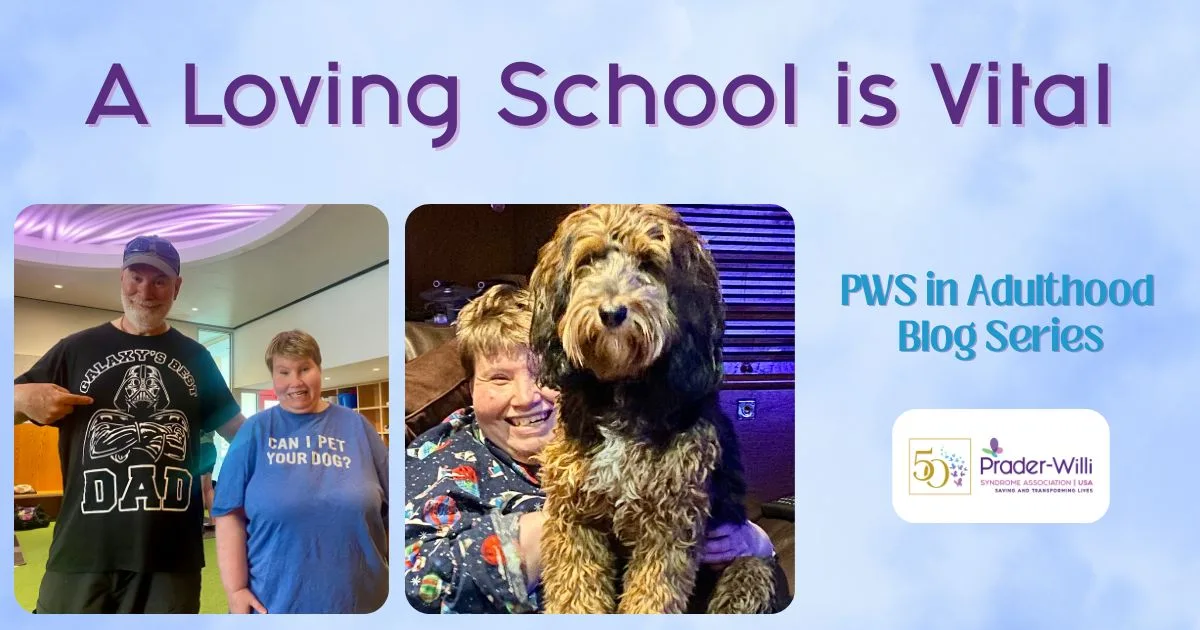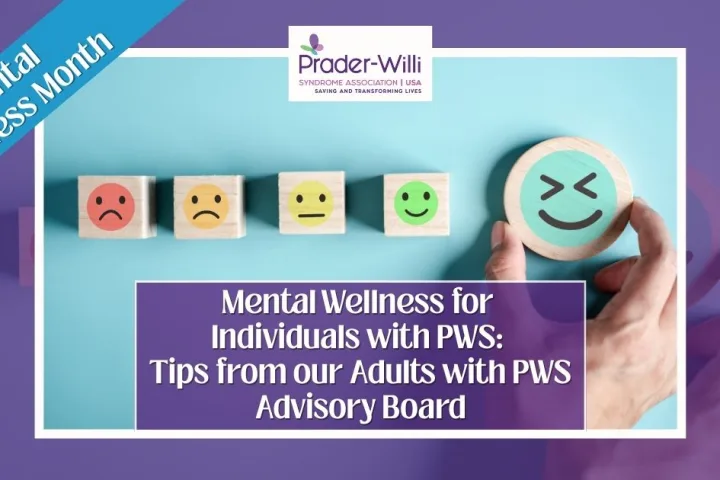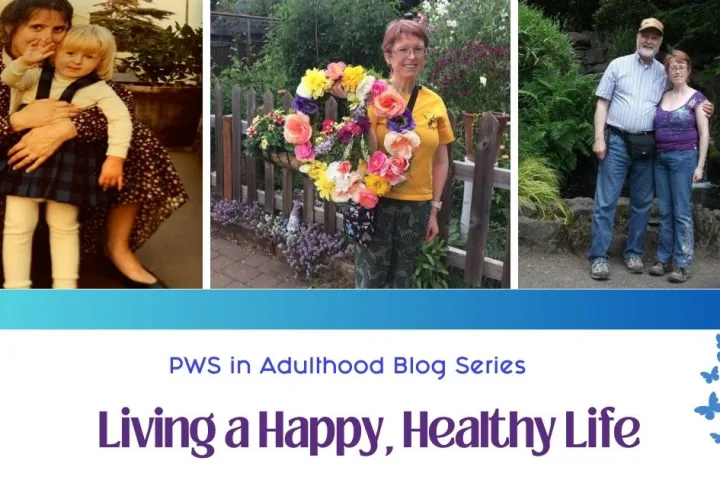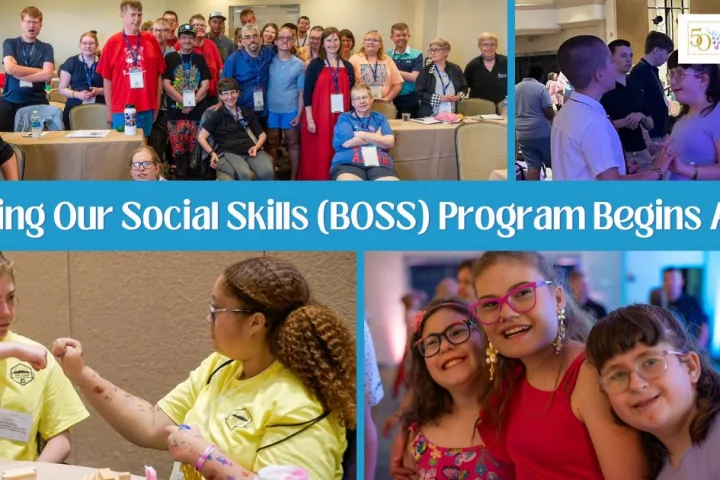contributed by Louis Schutz, father to Laura (38, living with PWS)
What steps did you take to prepare for her life as an adult?
In her teens, the rough behaviors became extreme. She was failing on many levels, even with doing everything we could. Placement felt like an option. Luckily an opening became available at an all PWS placement in Wisconsin. We lived in Illinois, but it was the one place we not only felt was good but open. I had tried finding a closer place with zero luck.
Then we had to decide, was it easier to place her younger or older? Was this in her best interests? And a million other questions. So, we tried it, and she began doing better. Slowly.
Now, years later, we feel those choices improved her life. Moving back to a PW resident in Illinois she was in an all-special needs school where she really thrived. They had a loving caring staff that embraced and encouraged her. She loved it. I cannot express the importance of a school where they truly fit in. So many fail in regular schools, it is a never-ending theme.
After graduation they gave her the First Reading Award ever. Now she is in a Sheltered Workshop, has a job, and her own life. Luckily, we can see her often and the transition home and back is seamless.
What does independence look like?
Her own life away from us. A workshop job with lots of friends and great staff. Standing up for herself and learning how to have her own life. Being included in decisions that affect her life.
What supports are in place?
She has loving family and friends and wonderful staffing at her group home and workshop. These are the key to it all.
Romantic Relationships
These have proved to be tough. So many roadblocks of emotions. But like many of us the highs and lows are part of life. They seem to hit her harder, but as she has matured, they are better dealt with.
Volunteer/Work in the Community
Yes, she volunteers at our wonderful library. with Rainbow Therapy dogs and special needs kids. She helps them interact and guides them to learning about safety with dogs too. One mom brings her wheelchair bound son and Laura takes over for the entire session, often leaving her alone to help him. That’s Trust.
Advice for Parents on Preparing for Adulthood
Behavior Modifications…begin as soon as you can to learn techniques to help them. One instance is tantrums. When the tantrums are over and the individuals is calmer, talk about what happens and how to minimize the outbursts and triggers. It takes years but it has worked for us and has made a huge difference. She now talks about not liking the old hissy fit younger her. It’s very rewarding for all. Lose the battles but win the war.
More about Laura
A loving school is vital.
During PWS awareness month they post a common trait of it everyday. I read them and think…Yes that’s Laura. Each one. Then I realize it is who she and they are, to their genetic core. But what’s often overlooked is how sweet and loving they are. Everyone is her friend. Every dog her buddy.
Thank you for sharing Laura’s story with us!
Share your story by filling out the form below.
Please note that not all questions are required. We invite you to share what you are inspired to share.
Share this!





 Perry A. Zirkel has written more than 1,500 publications on various aspects of school law, with an emphasis on legal issues in special education. He writes a regular column for NAESP’s Principal magazine and NASP’s Communiqué newsletter, and he did so previously for Phi Delta Kappan and Teaching Exceptional Children.
Perry A. Zirkel has written more than 1,500 publications on various aspects of school law, with an emphasis on legal issues in special education. He writes a regular column for NAESP’s Principal magazine and NASP’s Communiqué newsletter, and he did so previously for Phi Delta Kappan and Teaching Exceptional Children. Jennifer Bolander has been serving as a Special Education Specialist for PWSA (USA) since October of 2015. She is a graduate of John Carroll University and lives in Ohio with her husband Brad and daughters Kate (17), and Sophia (13) who was born with PWS.
Jennifer Bolander has been serving as a Special Education Specialist for PWSA (USA) since October of 2015. She is a graduate of John Carroll University and lives in Ohio with her husband Brad and daughters Kate (17), and Sophia (13) who was born with PWS. Dr. Amy McTighe is the PWS Program Manager and Inpatient Teacher at the Center for Prader-Willi Syndrome at the Children’s Institute of Pittsburgh. She graduated from Duquesne University receiving her Bachelor’s and Master’s degree in Education with a focus on elementary education, special education, and language arts.
Dr. Amy McTighe is the PWS Program Manager and Inpatient Teacher at the Center for Prader-Willi Syndrome at the Children’s Institute of Pittsburgh. She graduated from Duquesne University receiving her Bachelor’s and Master’s degree in Education with a focus on elementary education, special education, and language arts. Evan has worked with the Prader-Willi Syndrome Association (USA) since 2007 primarily as a Crisis Intervention and Family Support Counselor. Evans works with parents and schools to foster strong collaborative relationships and appropriate educational environments for students with PWS.
Evan has worked with the Prader-Willi Syndrome Association (USA) since 2007 primarily as a Crisis Intervention and Family Support Counselor. Evans works with parents and schools to foster strong collaborative relationships and appropriate educational environments for students with PWS. Staci Zimmerman works for Prader-Willi Syndrome Association of Colorado as an Individualized Education Program (IEP) consultant. Staci collaborates with the PWS multi-disciplinary clinic at the Children’s Hospital in Denver supporting families and school districts around the United States with their child’s Individual Educational Plan.
Staci Zimmerman works for Prader-Willi Syndrome Association of Colorado as an Individualized Education Program (IEP) consultant. Staci collaborates with the PWS multi-disciplinary clinic at the Children’s Hospital in Denver supporting families and school districts around the United States with their child’s Individual Educational Plan. Founded in 2001, SDLC is a non-profit legal services organization dedicated to protecting and advancing the legal rights of people with disabilities throughout the South. It partners with the Southern Poverty Law Center, Protection and Advocacy (P&A) programs, Legal Services Corporations (LSC) and disability organizations on major, systemic disability rights issues involving the Individuals with Disabilities Education Act (IDEA), Americans with Disabilities Act (ADA), and the federal Medicaid Act. Recently in November 2014, Jim retired.
Founded in 2001, SDLC is a non-profit legal services organization dedicated to protecting and advancing the legal rights of people with disabilities throughout the South. It partners with the Southern Poverty Law Center, Protection and Advocacy (P&A) programs, Legal Services Corporations (LSC) and disability organizations on major, systemic disability rights issues involving the Individuals with Disabilities Education Act (IDEA), Americans with Disabilities Act (ADA), and the federal Medicaid Act. Recently in November 2014, Jim retired.